OUR APPROACH
Fueling extraordinary leadership
Neuberg Gore provides world-class coaching to quickly address our clients’ most pressing challenges and practical tools that position leaders for long-term success.
“Startup entrepreneurs are the activists of business. If you want the quickest way to impact the world positively, back entrepreneurs.”
— Bryan Neuberg
WHAT WE DO
Supporting High-Performing Startup Leaders
Since its inception in 2012, Neuberg Gore has been dedicated to coaching founders of fast-scaling startups. We uniquely understand how to help them navigate pivotal moments and scale with their companies.
Our coaching and proprietary toolset helps leaders identify their growth areas, track their progress and continually improve themselves and their entire teams.
Once a startup is rapidly scaling, founders have new mandates: up-level yourself, grow your team and drive the business. That’s a big change from what’s needed in a startup’s disruptive early days. But successfully managing the transition to a high-growth company can mean the difference between a fire sale and a successful exit.
This is the arena where we like to play, which means we have to move fast. Most of our clients need to generate immediate results. They have six-to-nine months to level up, build the team, create results, get funding… iterate and keep going.
We help founders up-level themselves and grow their companies. Our job is to help leaders identify their blindspots, quickly acquire new skills, build their teams, navigate challenges and continuously drive the company forward. Getting that balance right is what inspires us — and what helps our clients become effective and even transformative leaders.
OUR COACHING
Our coaches work with our clients in four key areas:
Leadership Assessment & Skill Development
Crisis Management & Challenging Conversations
Thought Partnership & Decision-Making
Individual Growth & Mindset Shifts

“Untapped potential is painful to watch. For people who can make a difference, who are contributing to society, I want to give them the tools to be successful. I want to give to people who are giving back.”
— Jason Gore
WAYS TO ENGAGE WITH US
Executive Coaching
We work solely with founders and leaders of high-growth startups, and uniquely understand how to help them scale with their companies and navigate pivotal moments.
Embedded Coaching
We help you hire a full-time, salaried coach who we train to use our playbook. They are fully dedicated to coach your leaders, develop your individual contributors and build a high-performance culture.
Growth through behavioral science
In working with hundreds of startup leaders, we needed a toolset that could help them navigate difficult conversations, understand their blindspots, and quickly grasp how to be effective leaders.
We couldn’t find one, so we built it. We started by asking 225+ startup executives how they built or lost the confidence of their teams. Based on that research, we created a set of tools that lay the foundations for leadership development and collaborative cultures.
The 7 Pillars of Leadership
Defining leadership around the core behaviors great leaders master.
By identifying the areas where executives gain or lose the trust of their teams, the Seven Pillars of Leadership™ offers a simple way to become a better leader. In tandem with the SLI leadership assessments, the 7 Pillars provides a daily practice, helping emerging leaders target their weaknesses and develop better habits. Each pillar is further broken down into micro-behaviors, creating a comprehensive guide to growth through incremental change.
The Saturn Leadership™ Index is also the foundation for our embedded coaching programs, which support middle managers and build collaborative cultures.
The 7 Pillars of Leadership
Inspires with a clear vision and roadmap
Listens with openness and curiosity,
Speaks with transparency and authenticity
Facilitates healthy debates and meetings
Makes Decisions inclusively and effectively
Delegates effectively and creates accountable teams
Supports Others in developing and succeeding.
SATURN LEADERSHIP™ INDEX
The SLI is the foremost behavioral application of its kind, providing a practice regimen and leadership growth plan for hundreds of startup CEOs and executives.
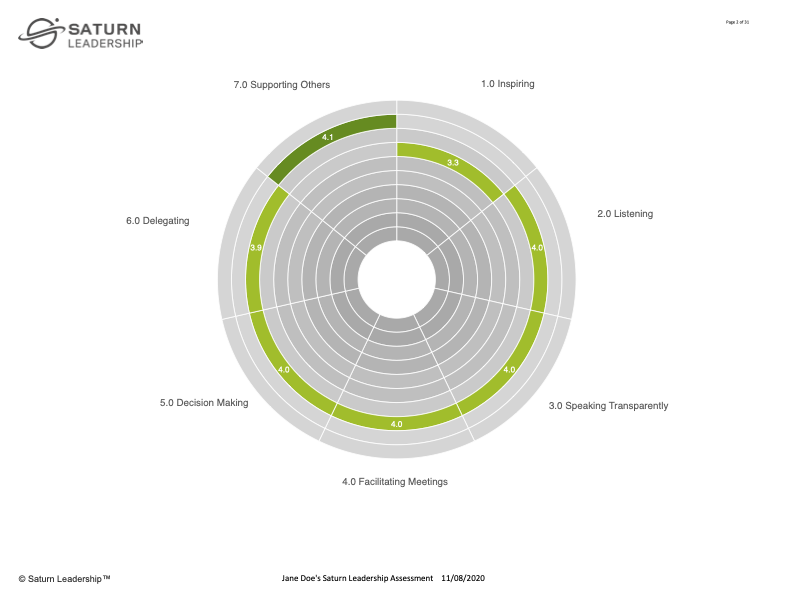
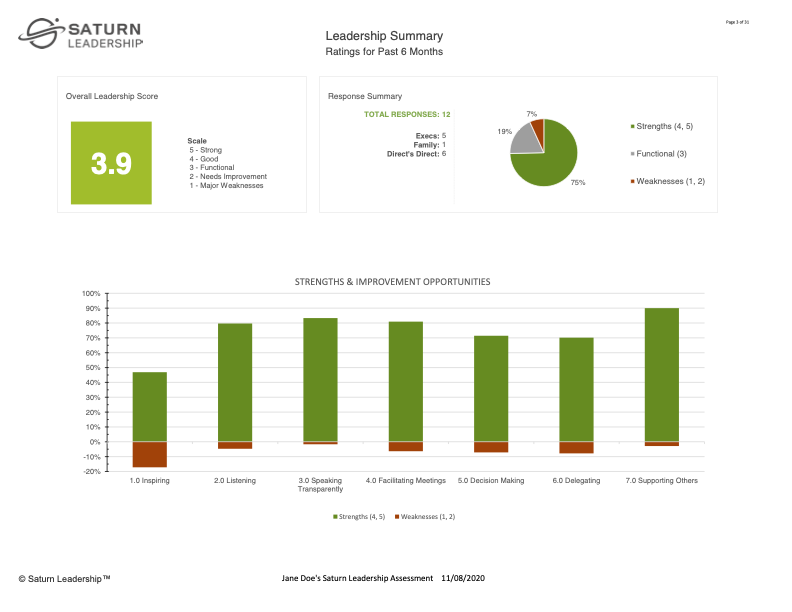
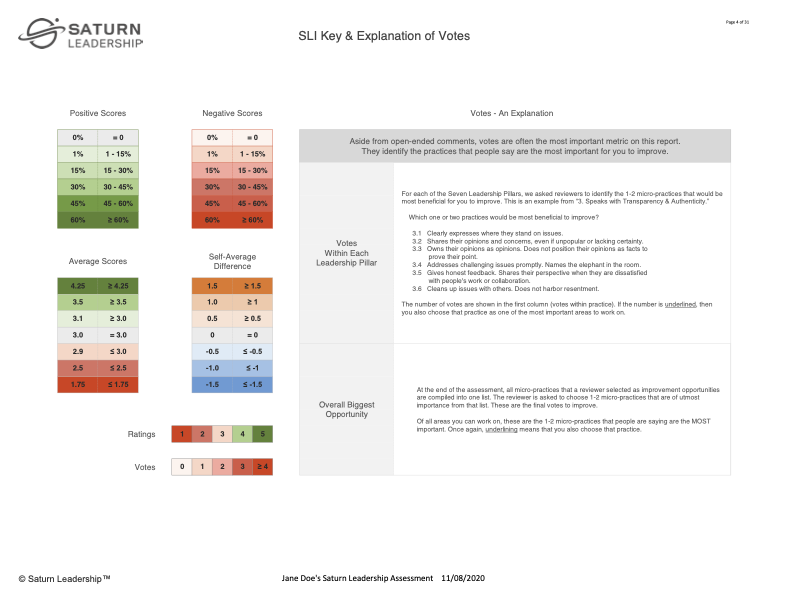
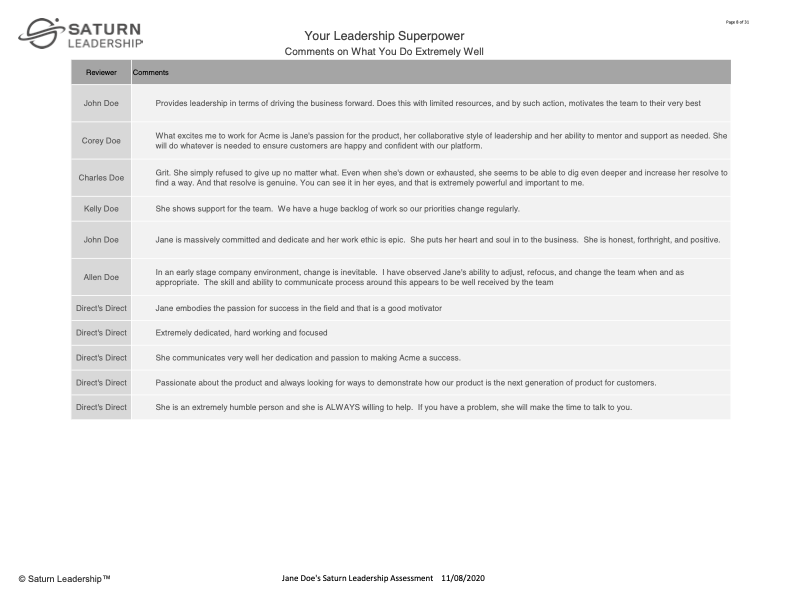
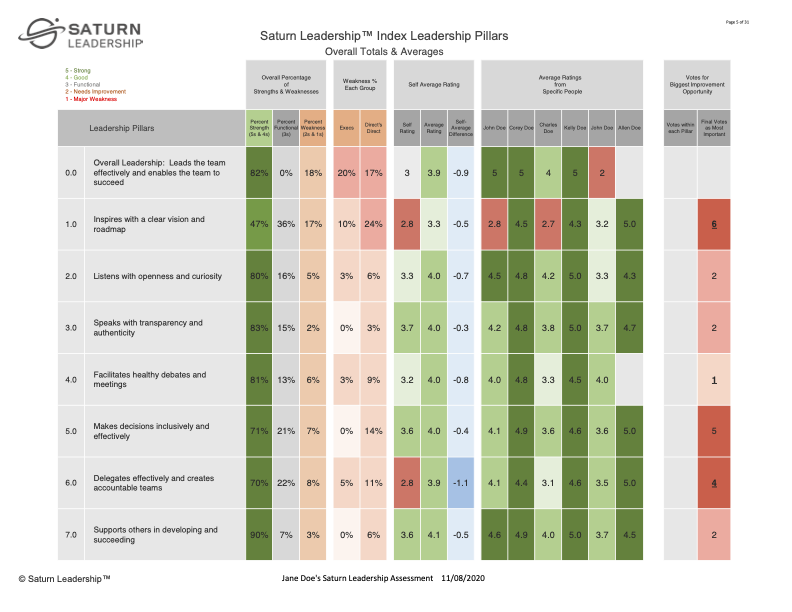
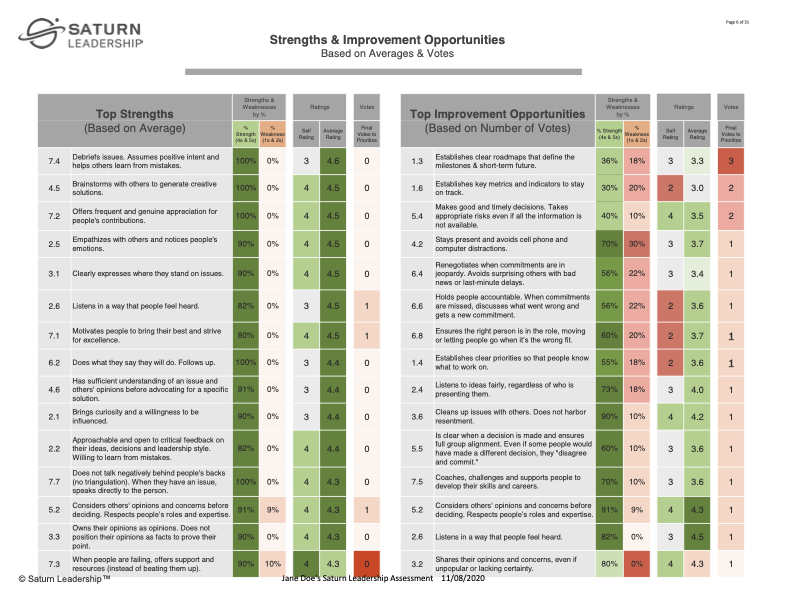
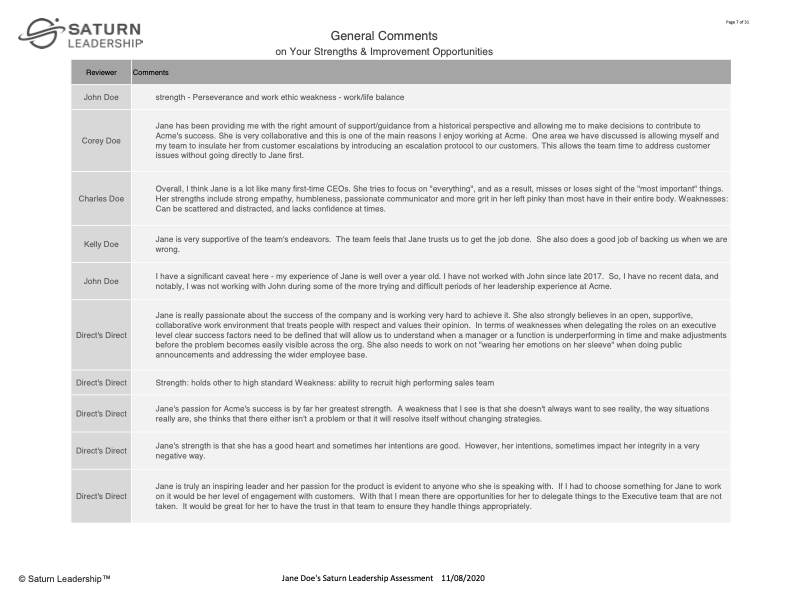
Powered by pioneering behavioral tools, the Saturn Leadership Plan is the most comprehensive and actionable growth curriculum available, providing an auditable and practical guide to micro-changes that transform leadership.
Saturn’s Self-Assessment is a quick and easy way for leaders to understand their leadership in terms of four aspects of communication, seven pillars of leadership, and nine foundations of building trust. Addressing 51 micro-behaviors in all, the SLI Self-Assessment is the fastest way to identify your blindspots and see how you do in the behaviors that great leaders master. We invite everybody to take it here.
Saturn’s Leadership Index 360 goes deeper by asking your team members how you do across the same micro-behaviors. You nominate a mix of anonymous and on-the-record colleagues who assess how you best communicate and lead — and where you need work.
Seven Leadership Pillars
Inspires with a clear vision and roadmap
1.
Listens with openness and curiosity
2.
Speaks with transparency and authenticity
3.
Facilitates healthy debates and meetings
4.
Makes Decisions inclusively and effectively
5.
Delegates effectively and creates accountable teams
6.
Supports Others in developing and succeeding
7.
Leadership Behaviors (51)1. Inspires with a Clear Vision & Roadmap
1.1 Embodies and shares a compelling vision of the future. (Podcast)
1.2 Communicates and breaks down the vision so that people see how they fit in. (Podcast)
1.3 Establishes clear roadmaps that define the milestones & short-term future. (Podcast)
1.4 Renegotiates priorities with others when things change. Does not pile on new objectives without reprioritizing old ones. (Podcast)
1.5 Establishes clear priorities so that people know what to work on. (Podcast)
1.6 Establishes key metrics and indicators to stay on track. (Podcast)
2. Listens with Openness & Curiosity
2.1 Brings curiosity and willingness to be influenced. (Podcast)
2.2 Actively seeks different perspectives outside their own.
2.3 Approachable and open to critical feedback on their ideas, decisions and leadership style. Willing to learn from mistakes. (Podcast)
2.4 Digs for others’ underlying interests and concerns. (Podcast)
2.5 Listens to ideas fairly, regardless of who is presenting them. (Podcast)
2.6 Empathizes with others and notices people’s emotions. (Podcast)
2.7 Listens in a way that people feel heard. (Podcast)
3. Speaks with Transparency & Authenticity
3.1 Clearly expresses where they stand on issues. (Podcast)
3.2 Shares their opinions and concerns, even if unpopular or lacking certainty. (Podcast)
3.3 Owns their opinions as opinions. Does not position their opinions as facts to prove their point. (Podcast)
3.4 Addresses challenging issues promptly. Names the elephant in the room. (Podcast)
3.5 Gives honest feedback. Shares their perspective when they are dissatisfied with people’s work. (Podcast)
3.6 Cleans up issues with others. Does not harbor resentment. (Podcast)
3.7 Admits when they made a mistake or were not accurate.
4. Facilitates Healthy Debates & Meetings (Best Practices)
4.1 Leads effective meetings. Clarifies the objectives and avoids unnecessary rabbit holes. (Podcast)
4.2 Stays present and avoids cell phone and computer distractions. (Podcast)
4.3 Embraces creative conflict. Does not shy away from passionate debate. (Podcast)
4.4 Draws the quiet people out. (Podcast)
4.5 Brainstorms with others to generate creative solutions. (Podcast)
4.6 Has sufficient understanding of an issue and others’ opinions before advocating for a specific solution. (Podcast)
5.1 Includes the right people in decision-making. (Podcast)
5.2 Considers others’ opinions and concerns before deciding. Respects people’s roles and expertise. (Podcast)
5.3 Has a bias for action. Willing to try out ideas and see what is learned, eg. rapid prototyping. (Podcast)
5.4 Makes good and timely decisions. Takes appropriate risks even if all the information is not available. (Podcast)
5.5 Is clear when a decision is made and ensures full group alignment. Even if some people would have made a different decision, they “disagree and commit.” (Podcast)
5.6 Establishes clear next steps. (Podcast)
5.7 Proactively informs people who are impacted by decisions. (Podcast)
6.1 Ensures commitments are clear, realistic, and agreed upon (who is doing what by when). (Podcast)
6.2 Tracks progress on commitments and ensures completion. (Podcast)
6.3 Does what they say they will do. Follows up. (Best Practices, Podcast)
6.4 Renegotiates when commitments are in jeopardy. Avoids surprising others with bad news or last-minute delays. (Podcast)
6.5 Proactively seeks support from others when needed.
6.7 Holds people accountable. When commitments are missed, discusses what went wrong and gets a new commitment. (Best Practices, Podcast)
6.6 Allows people to fulfill their roles and make decisions without micromanaging them. (Best Practices, Podcast)
6.8 When tasks are completed, gives helpful feedback (both positive and negative). (Best Practices, Podcast)
6.9 Builds a diverse team that can accomplish the goals of their function.
6.10 Ensures the right person is in the role, moving or letting people go when it’s the wrong fit. (Podcast)
7.1 Motivates people to bring their best and strive for excellence. (Podcast)
7.2 Offers frequent and genuine appreciation for people’s contributions. (Podcast)
7.3 When people are failing, offers support and resources (instead of beating them up). (Podcast)
7.4 Debriefs issues. Assumes positive intent and helps others learn from mistakes. (Podcast)
7.5 Coaches, challenges and supports people to develop their skills and careers. (Podcast)
7.6 Leads effective 1-on-1’s. (Podcast)
7.7 Does not talk negatively behind people’s backs (no triangulation). When they have an issue, they speak directly to the person. (Podcast)
7.8 Cultivates an inclusive team environment where every team member can speak up and fully contribute.
5. Makes Decisions Inclusively & Effectively
6. Delegates Effectively & Creates Accountable Teams
7. Supports Others in Developing and Succeeding
